The case of a missing maid has ignited a class war in a luxury housing complex in India
It was “Malda again,” some alarmists claimed on social media, referring to the communal violence that had broken out in the West Bengal district in January 2016. Others demanded that Bangladeshis be thrown out of India. At the centre of this exaggerated panic was a dispute between a family in Noida’s posh Mahagun Moderne Society gated community and their Muslim domestic worker from West Bengal, which led to a riot-like situation on Wednesday morning (July 12) that the Uttar Pradesh police was summoned to control.
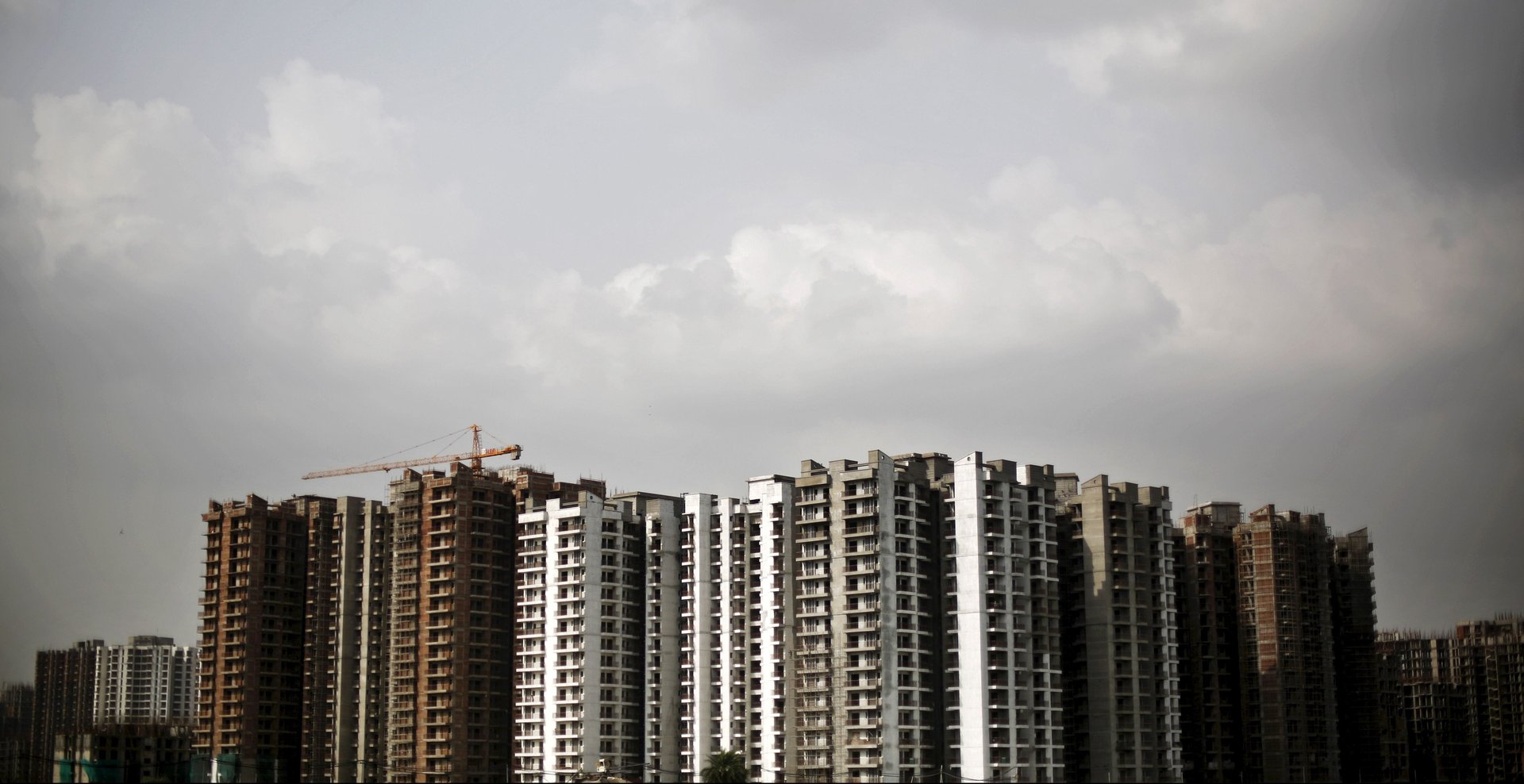

It was “Malda again,” some alarmists claimed on social media, referring to the communal violence that had broken out in the West Bengal district in January 2016. Others demanded that Bangladeshis be thrown out of India. At the centre of this exaggerated panic was a dispute between a family in Noida’s posh Mahagun Moderne Society gated community and their Muslim domestic worker from West Bengal, which led to a riot-like situation on Wednesday morning (July 12) that the Uttar Pradesh police was summoned to control.
By the end of the day, two first information reports (FIRs) had been filed with the police. The first was against the domestic worker’s employer and unidentified persons in the housing complex. The other was against unidentified members of the crowd that had forced their way into the gated community early on Wednesday morning.
The incident in the housing society in Noida’s Sector 78, approximately 23km from New Delhi, is the latest manifestation of the intense hostility between privileged Indians and their domestic workers that seems to erupt in India’s cities with frightening regularity. But it was perhaps for the first time that such a dispute had swelled to such proportions, there were accusations that security guards had fired into the air to disperse a crowd angered at the treatment meted out to the domestic worker.
Missing woman
By 3pm on Wednesday, the shattered windows of the cabin that housed the security guards at the entrance of the complex and the unusually large number of policemen standing outside its gates were the only evidence of the tense situation that prevailed earlier in the day.
It began at around 7am, when a group of over 100 persons attempted to force their way into the premises of Mahagun Moderne. They were looking for a woman who was employed as a domestic worker at the housing society. Zohra Bibi, 27, who had three children, had not returned to her home in a slum in Sector 78 the previous night.
Videos of the incident show the complex’s security guards throwing back stones pitched by the protesters.
Conflicting narratives
On Tuesday night, following a missing complaint by Bibi’s husband Abdul Sattar, the police searched the society’s premises but she was not found.
The police claim Bibi was rescued on Wednesday morning from a room in the basement of one of the buildings, where she had taken shelter after being physically assaulted by a Mahagun Moderne resident. The resident has been identified as Anshu Sethi in one of the two FIRs. Sethi’s husband, Mitul Sethi, is the complainant in the second FIR.
However, Bibi contested the police version, saying she was held captive overnight in the Sethis’ apartment and that she had not been in the basement. She had quit working for the Sethis around 15 days ago and had visited them on Tuesday to ask for two months’ salary dues, Bibi said.
The FIR against the Mahagun Moderne residents was filed on the basis of Bibi’s statement, the police said. However, she also denies having given any statement to the police.
The Mahagun Moderne residents claim Bibi had run away from the Sethis’ apartment on Tuesday after she was accused of theft. “She admitted to have stolen Rs10,000 over a period of time when Mrs Sethi told her that she could produce CCTV footage to prove that,” claimed Dharmendra Rathode, a resident. “However, she [Sethi] did not have any such footage with her.”
Migrant workers
The protesters at Mahagun comprised migrant workers, both men and women, living in the slum clusters in and around Sector 78, which has a profusion of luxury high-rises.
Many of the residents of these slum clusters are migrants from the West Bengal districts of Cooch Behar, Malda, and Jalpaiguri, besides Assam. While the men work for daily wages in the construction industry in buildings being constructed in the satellite township, the women are usually employed as domestic workers in these plush residential apartments.
Some of the protesters said Mahagun’s security guards fired in the air to scare them off. However, Parshuram, the station house officer (SHO) of Sector 49 police station, under whose jurisdiction Mahagun falls, refuted that claim. “We have registered two cases based on complaints from both parties and the investigation is underway,” he said.
‘Pay my dues’
“What could I do?” said Sattar, a migrant from West Bengal’s Cooch Behar. “There was no other way to find my wife.”
According to the security register maintained by Mahagun’s security guards, Bibi had entered the society’s premises on Tuesday morning but did not come out, Sattar said. “I knew that she was there but both the police and security guards claimed they could not find her there,” he said. “So, the next morning, I went there with some neighbours to rescue my wife and soon people from some neighbouring slums joined us, too.”
Mamata Bibi, 35, a cook in the Sethi home, said she had accompanied Bibi to the apartment on Tuesday morning. “While we left their house by 9am, madam had asked her to come again in the evening to collect her dues,” said Mamata Bibi. “She [Zohra Bibi] had clearly stated that she did not want to work there any longer and madam was unhappy with her decision.”
After Zohra Bibi emerged from the complex in the morning, the police took her to hospital for a medico-legal check-up. Later, SHO Parshuram said she had sustained no injuries.
Adding perspective to the incident were Facebook posts from Nilanjana Bhowmick, who lives in a neighbouring complex. She had gone to the site as a “concerned citizen” and had intervened to stop the protesters from clashing with the police.
Bhowmick, who had met Bibi on Wednesday evening, said the woman “consistently reiterated that she was locked up in a room.”
Bhowmick wrote:
“We had to carry her to the car to take her for a medical examination. She vomited all the way. It was painful. And she kept asking, ‘why would they do this to me?’ Why indeed. I have never felt so ashamed of my privilege as I felt then. As I have felt all of today.”
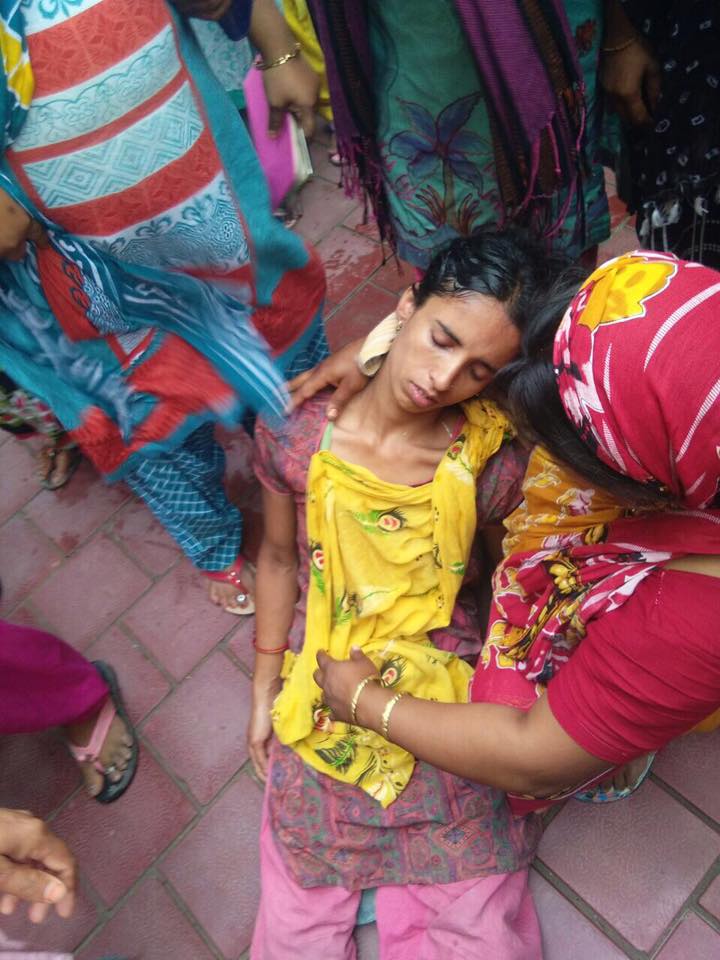
A ban on workers
The Mahagun website says the homes in Mahagun Moderne Society, one of the several luxury properties the realty firm has constructed, “mirror the taste of (the) affluent class and include an array of space options (2, 3, 4 BHK units) comprising of high rise apartments, duplex apartments, independent floors, penthouses in addition to an iconic tower Marvella dedicated to luxurious 5 BHK units.” (BHK here refers to bedroom, hall, and kitchen.)
The complex is spread over 25 acres, the website says. Security guards said it has over 2,800 apartments, of which 2,000 are occupied. Nearly 600 domestic workers visit it every day, they said.
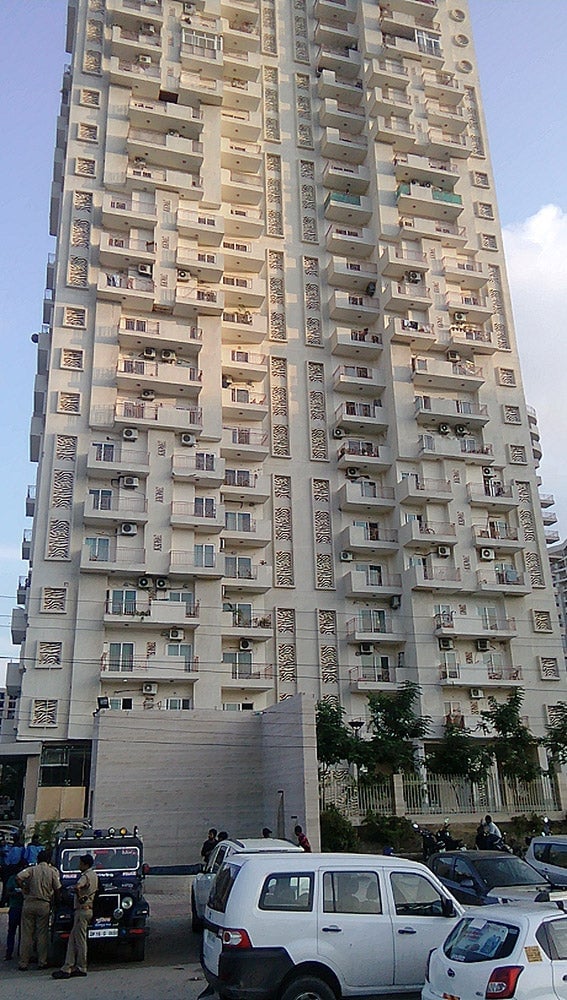
On Wednesday evening, the society held a meeting of its residents, which was attended by some senior Noida police officers. “In the meeting, we decided that no domestic worker should be allowed entry unless the matter is fully resolved,” said resident Dharmendra Rathode.
Over 150 families live in the isolated slum in Sector 78 where Bibi lives in a tin shack. A significant number of women there, including at least 30 who are her neighbours, work at Mahagun Moderne.
The workers usually have two shifts—between 6am and 1pm and between 4pm and 9pm. Their salaries vary. While basic household cleaning jobs bring them Rs1,500 per household, salaries go up to between Rs4,500 and Rs5,000 for cooking and doing the dishes.
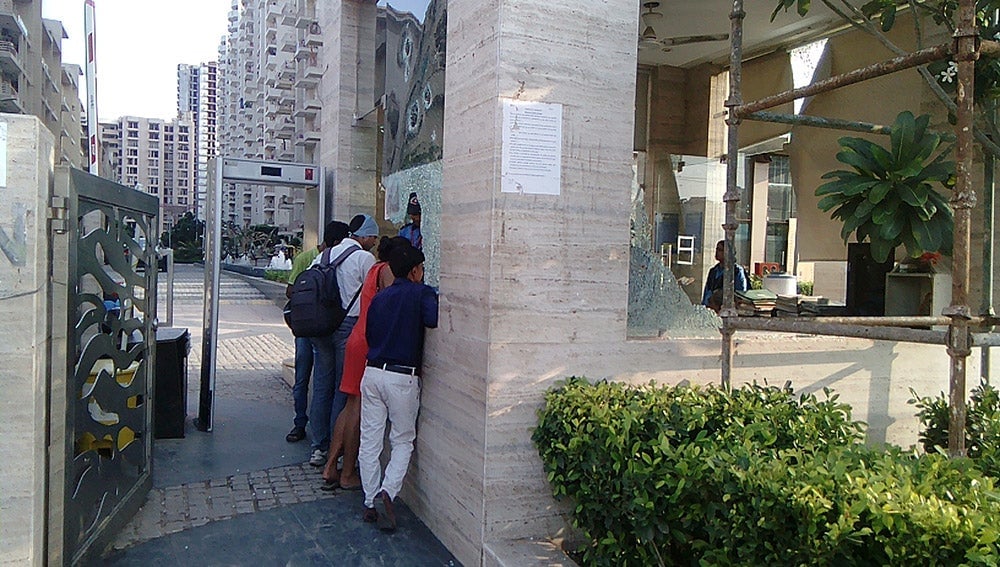
Workers show solidarity
Bibi’s case has stunned other domestic workers. “In Zohra’s case, we all joined the protest out of fear,” said Mona Biswas, a migrant from Siliguri, West Bengal. “Tomorrow, it could happen to any of us.” Biswas has been living in the Delhi National Capital Region with her family for over 10 years and works as a cook in four households in Mahagun Moderne.
As is the case with domestic workers across the country, humiliation by some employers is so common that some of them do not even recognise it as such.
Asked if she had ever been humiliated by her employers, 55-year-old Meera Haldar, another Mahagun Moderne domestic help, did not seem to understand the query. Later, she recalled an incident in which she was accused of theft after they spotted her eating two biscuits with some water in her employer’s kitchen. “It was not their biscuits at all,” she said. “We do not get to eat anything for long hours and we occasionally carry light snacks from home.” Haldar lives with her family at a slum cluster in Noida’s Barola village near Sector 49.
Domestic workers complain of other problems not unique to Mahagun Moderne. “At times we find that our employers are not home,” said Haldar, who hails from Malda. “It is not possible to come back home, nor can we rest in one of the parks in the society as the security guards do not allow it. Most employers also take offence if we ask them if we can rest in their homes for a while.”
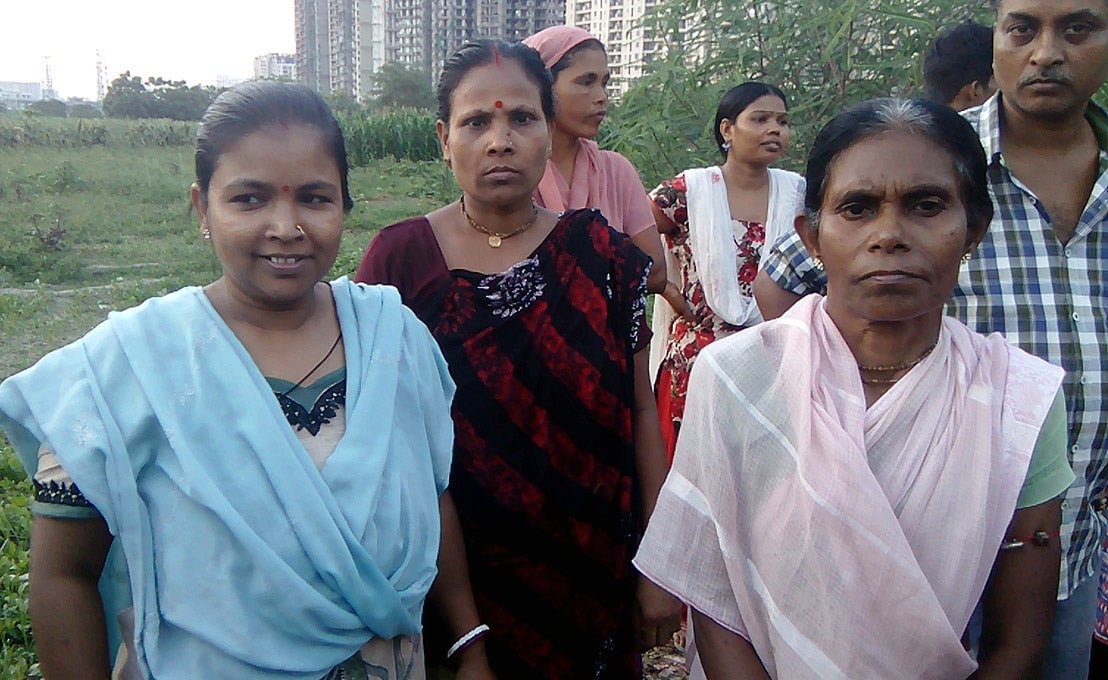
At 6pm, in the slum cluster that Bibi and members of her fraternity call home, there was anxiety once news of the society’s decision to ban their entry reached them. For a few minutes, some of them pondered whether to contact their employers over the decision. But they later changed their minds and decided to take Bibi to a hospital instead.
“She did not eat any food today and has been vomiting since morning,” said Sattar. “We have no clue about what the doctors said when the police took her to the hospital in the morning.”
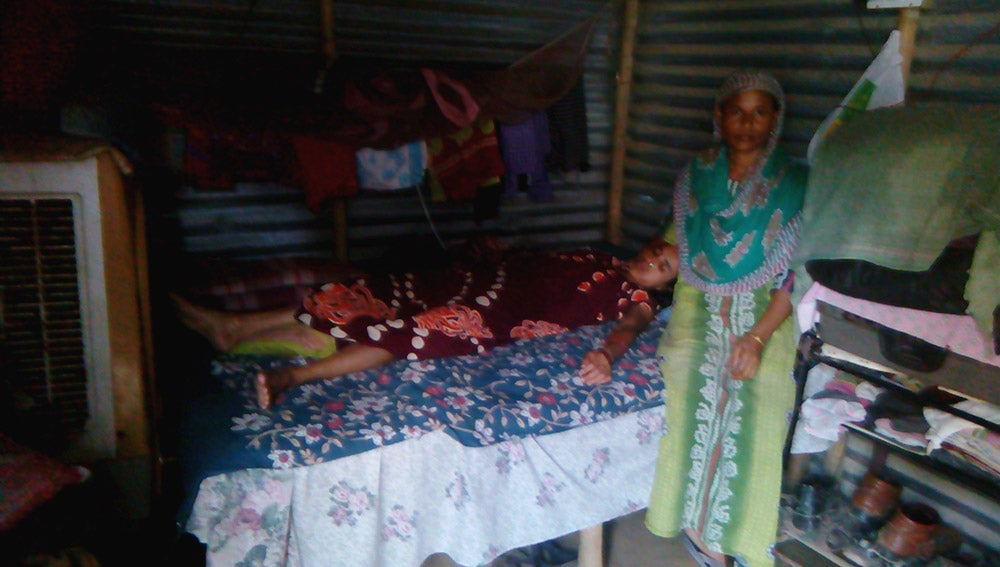
This post first appeared on Scroll.in. We welcome your comments at [email protected].